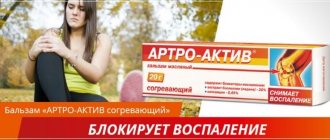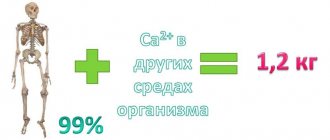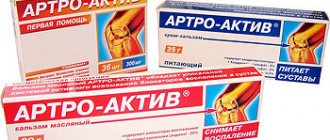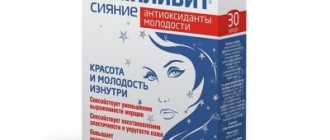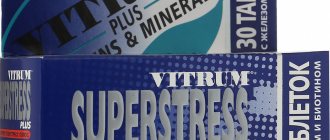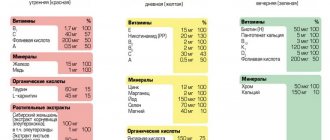Manufacturer: DIODE
Active ingredients
- Not indicated. See instructions
Pharmacological action
- Not indicated. See instructions
- Composition of Calcium-Active
- Indications for use of the drug Calcium-Active
- Release form of the drug Calcium-Active
- Contraindications to the use of the drug Calcium-Active
- Method of administration and dosage of the drug Calcium-Active
- Storage conditions for the drug Calcium-Active
- Shelf life of the drug Calcium-Active
pharmachologic effect
Calcium-Active is used to prevent diseases associated with calcium metabolism disorders. It allows you to maintain calcium balance at the required level for a long time. The dietary supplement includes:
- complexone, which is responsible for the regulation of calcium metabolism and normalizes the functioning of the “destruction-building” system of bone tissue;
- organic, easily digestible calcium: its source is the medicinal plant amaranth, the leaves of which contain a large amount of this element;
- phosphorus and vitamin D3, which improve the metabolism and absorption of calcium, which enters the body with food.
This combination of components in a dietary supplement allows you to cope with calcium deficiency and ensures its complete absorption by the body, preventing the destruction of bone tissue.
Pharmacokinetics
The pharmacokinetics of Calcium-Active have not been sufficiently studied at the moment.
Best before date
36 months
Vitamins with similar effects
- Betulanorm (Capsule)
- For the genitourinary system Life formula (Capsule)
- Coffeeberry (Capsule)
- Sana-Sol - Vitamin C (Oral tablets)
- Pancreavit (Capsule)
- Maxiflorum tea Grace with hibiscus and stevia (Powder for preparing a solution for oral administration)
- Zhiznestin (Manager) (Drops for oral administration)
The description of vitamin Calcium-Active is intended for informational purposes only. Before starting to use any drug, it is recommended to consult a doctor and read the instructions for use. For more complete information, please refer to the manufacturer's instructions. Do not self-medicate; EUROLAB is not responsible for the consequences caused by the use of information posted on the portal. Any information on the project does not replace consultation with a specialist and cannot be a guarantee of the positive effect of the drug you use. The opinions of EUROLAB portal users may not coincide with the opinions of the site Administration.
Are you interested in vitamin Calcium-Active? Do you want to know more detailed information or do you need a doctor's examination? Or do you need an inspection? You can make an appointment with a doctor - the Euro lab is always at your service! The best doctors will examine you, advise you, provide the necessary assistance and make a diagnosis. You can also call a doctor at home . Euro lab clinic is open for you around the clock.
Attention! The information presented in the vitamins and dietary supplements section is intended for informational purposes and should not be a basis for self-medication. Some of the drugs have a number of contraindications. Patients need to consult a specialist!
If you are interested in any other vitamins, vitamin-mineral complexes or dietary supplements, their descriptions and instructions for use, their analogues, information about the composition and form of release, indications for use and side effects, methods of use, dosages and contraindications, notes about the prescription of the drug for children, newborns and pregnant women, price and consumer reviews, or you have any other questions and suggestions - write to us, we will definitely try to help you.
Indications for use
Calcium-Active is prescribed to improve the functional state of the musculoskeletal system, including:
- Elimination of calcium and vitamin D3 deficiency that has developed due to nutritional disorders or poor diets;
- Treatment of osteoporosis (simultaneously with other medications);
- Normalization of calcium and vitamin D3 metabolism, including complex therapy for patients with multiple caries and periodontal diseases (periodontitis of varying severity).
Directions for use and dosage
The instructions for use of Calcium-Active indicate that it should be taken with meals. Adolescents who have reached the age of 14 and adults are prescribed the same dosage of the drug: 2 tablets 2 times a day.
The duration of taking the dietary supplement is 1 month. If the need arises, you can repeat the course after a break of 10 days. For people with osteoporosis, the dosage should be doubled. In this case, the duration of taking the drug should be determined by the doctor. Those who have dental problems should take Calcium-Active in courses of 1–2 months, no more than 3 times a year.
Reviews about Calcium-Active
According to clinical studies, regular use of the drug increases bone density and eliminates pain in osteoporosis. It is also widely used in dentistry to treat caries and periodontitis. Reviews about Calcium-Active are mostly positive. Many patients claim that this inexpensive dietary supplement allows you to quickly restore the structure of hair and nails, making them stronger and healthier. However, there are also opinions about the ineffectiveness of the drug, and wishes to add magnesium to the dietary supplement to enhance the effect on the body.
Where to buy Calcium Active Citrate (table 1.4g No. 36) Falkenstein
The drug is delivered throughout Russia and the CIS. The goods are paid for only upon receipt. As a rule, the price for Calcium Active Citrate (table 1.4g No. 36) Falkenstein in pharmacies is much higher than on the Internet. You can consult and get more detailed information about the product by entering contacts on the official website, the operator will call you back within a few minutes.
The discounted price on the official website is 217 rubles.
Go to the official website Calcium Active Citrate (table 1.4g No. 36)
Characteristics of the drug
The vitamin complex Nycomed contains two active ingredients:
- calcium in the form of carbonate – 500 mg;
- vitamin D3 – 200 IU.
In addition to them, the composition contains auxiliary components, among which it is worth highlighting sorbitol, povidone, and flavorings. The drug is available in the form of chewable tablets with mint, orange, lemon, strawberry or watermelon flavors. Packaging volumes – 30, 60, 100 and 120 pcs.
The supplement is produced by Takeda and is prescribed in the following cases:
- deficiency of Ca and vitamin D3;
- prevention and treatment of osteoporosis;
- rickets therapy.
You can learn about the signs of vitamin D deficiency after watching the video:
The drug can be taken by children from 3 years of age and elderly patients (with caution). The price of a package with a volume of 120 tablets ranges from 455-600 rubles.
Instructions:
Clinical and pharmacological group
17.023 (Multivitamins with macro- and microelements)
Release form, composition and packaging
◊ Film-coated tablets from light green to green, biconvex, oblong; on the fracture - yellow-gray with inclusions of different colors.
| 1 tab. | |
| retinol acetate (vit. A) | 791.2 mcg (2300 IU) |
| α-tocopherol acetate (Vit. E) | 10 mg |
| ergocalciferol (vit. D2) | 2.5 mcg (100 IU) |
| ascorbic acid (vit. C) | 50 mg |
| thiamine hydrochloride (vit. B1) | 1 mg |
| riboflavin (vit. B2) | 1 mg |
| calcium pantothenate (vit. B5) | 5 mg |
| pyridoxine hydrochloride (vit. B6) | 1.5 mg |
| folic acid (vit. Bc) | 200 mcg |
| cyanocobalamin (vit. B12) | 3 mcg |
| Nicotinamide (Vit.PP) | 7.5 mg |
| rutoside (rutin) (Vit. P) | 10 mg |
| calcium (in the form of calcium hydrogen phosphate dihydrate) | 35 mg |
| magnesium (as magnesium oxide) | 22 mg |
| phosphorus (in the form of calcium hydrogen phosphate dihydrate) | 27 mg |
| iron (as ferrous fumarate) | 10 mg |
| copper (as copper sulfate pentahydrate) | 1 mg |
| zinc (as zinc sulfate heptahydrate) | 5 mg |
| fluoride (as sodium fluoride) | 500 mcg |
| manganese (as manganese sulfate monohydrate) | 1 mg |
| iodine (as sodium iodite) | 100 mcg |
| Selenium (as sodium selenite) | 10 mcg |
Excipients: talc, potato starch, citric acid, low molecular weight povidone (low molecular weight polyvinylpyrrolidone), calcium stearate, stearic acid, sucrose (sugar).
Shell composition: hyprolose, macrogol 4000, low molecular weight povidone (low molecular weight polyvinylpyrrolidone), titanium dioxide, talc, indigo carmine, quinoline yellow dye (E104).
30 pcs. — polymer cans (1) — cardboard packs. 60 pcs. — polymer jars (1) — cardboard packs.
pharmachologic effect
Combined multivitamin preparation with micro- and macroelements.
The compatibility of the components in one tablet is ensured by a special technology for the production of vitamin-mineral complexes.
The pharmacological effect of the drug is due to the properties of its constituent vitamins and minerals.
Retinol acetate ensures normal function of the skin, mucous membranes, as well as vision function.
α-tocopherol acetate has antioxidant properties, maintains the stability of red blood cells, prevents hemolysis, and has a positive effect on the functions of the gonads, nervous and muscle tissue.
Ergocalciferol is involved in maintaining the metabolism of calcium and phosphorus, improves their absorption in the small intestine, and prevents the development of rickets.
Thiamine hydrochloride as a coenzyme is involved in carbohydrate metabolism and the functioning of the nervous system.
Riboflavin is the most important catalyst for the processes of cellular respiration and visual perception.
Pyridoxine hydrochloride as a coenzyme takes part in protein metabolism and the synthesis of neurotransmitters.
Ascorbic acid ensures collagen synthesis, participates in the formation and maintenance of the structure and function of cartilage, bones, teeth, affects the formation of hemoglobin, and the maturation of red blood cells.
Nicotinamide is involved in the processes of tissue respiration, fat and carbohydrate metabolism.
Folic acid takes part in the synthesis of amino acids, nucleotides, nucleic acids; necessary for normal erythropoiesis.
Rutin is involved in redox processes, has antioxidant properties, and promotes the deposition of ascorbic acid in tissues.
Calcium pantothenate, as a component of coenzyme A, is involved in the processes of acetylation and oxidation; promotes the construction and regeneration of epithelium and endothelium.
Cyanocobalamin is involved in the synthesis of nucleotides and is an important factor in normal growth, hematopoiesis and development of epithelial cells; necessary for folic acid metabolism and myelin synthesis.
Iron is involved in erythropoiesis and, as part of hemoglobin, ensures the transport of oxygen to tissues.
Cobalt regulates metabolic processes and increases the body's defenses.
Calcium is necessary for the formation of bone matter, blood clotting, the process of transmission of nerve impulses, contraction of skeletal and smooth muscles, and normal myocardial activity.
Copper prevents anemia and oxygen starvation of organs and tissues, and helps prevent osteoporosis. Strengthens the walls of blood vessels.
Zinc is involved in the metabolism of nucleic acids, proteins, fats, carbohydrates, fatty acids and hormones.
Magnesium plays an important role in protein biosynthesis and energy metabolism, reduces the excitability of the nervous system, and prevents the formation of kidney stones.
Phosphorus strengthens bone tissue and teeth, enhances mineralization, and is part of the ATP source of cell energy.
Manganese is necessary for normal growth, metabolism, osteogenesis processes, carbohydrate and lipid metabolism.
Selenium is involved in the regulation of tissue elasticity, has an antioxidant effect, protects cells and tissues of the body from the effects of adverse environmental factors.
Iodine is part of the thyroid hormones, which control the intensity of energy metabolism and actively influence the mental and physical development of a person, and the state of the central nervous system.
Fluoride is an essential element for normal growth and development of the body and reduces the incidence of dental caries.
Pharmacokinetics
The effect of the drug Complivit-Active is the combined effect of its components, so kinetic observations are not possible; Collectively, the components cannot be traced using markers or bioassays.
Dosage
Prescribe 1 tablet orally. 1 time/day after meals, with a sufficient amount of liquid. The course of treatment is 1 month.
Overdose
The patient should be informed that in case of accidental overdose, consult a doctor.
Treatment: temporarily stopping the drug, gastric lavage, taking activated charcoal, carrying out symptomatic therapy.
Drug interactions
The drug contains iron and calcium, and therefore delays the absorption of antibiotics from the tetracycline group and fluoroquinolone derivatives from the gastrointestinal tract.
With the simultaneous use of vitamin C and short-acting sulfa drugs, the risk of developing crystalluria increases.
Antacids containing aluminum, magnesium, calcium, and cholestyramine reduce iron absorption.
With simultaneous administration of thiazide diuretics, the risk of developing hypercalcemia increases.
Side effects
Possible: allergic reactions to the components of the drug.
Storage conditions and periods
The drug should be stored out of the reach of children, in a dry, dark place at a temperature not exceeding 25°C. Shelf life – 2 years.
Indications
Children and adolescents aged 7 to 12 years:
— for the prevention and treatment of hypovitaminosis, avitaminosis, lack of minerals and trace elements in the body during the period of growth and development;
— to increase the body’s resistance to increased physical and mental stress, with regular exercise;
- with insufficient and unbalanced nutrition;
— for regions with unfavorable environmental conditions.
Contraindications
- children under 7 years of age;
- hypervitaminosis A;
- increased levels of calcium and iron in the body;
- hypersensitivity to the components of the drug.
Use is not recommended for pernicious B12 deficiency anemia.
special instructions
If allergic reactions to the components of the drug Complivit-Active occur, it should be discontinued.
It is not recommended to take other multivitamin medications at the same time to avoid overdose.
During the period of use of Complivita-Active, urine may turn bright yellow, which has no clinical significance and is explained by the presence of riboflavin in the drug.
Conditions for dispensing from pharmacies
The drug is approved for use as a means of OTC.
Analogs for the active substance
Your doctor will tell you how to replace Calcium D3 Nycomed. Only he will be able to accurately determine which drug is suitable and will not cause adverse reactions.
Table 1 – Characteristics of analogues
| Name | Active ingredients, dosage | Release form | Manufacturer | A country |
| Complivit Calcium D3 |
| Chewable tablets | "Pharmstandard-Ufa VITA" | Russia |
| Calcium-Active |
| Pills | "Diode" | |
| Calcide |
| Tablets and capsules 0.4 g | "Comfort Complex" | |
| Calcium gluconate | Calcium gluconate – 500 mg | Tablets, injection solution | "Evalar" | |
| Natekal D3 |
| Chewable tablets | Italpharmaco | Italy |
Complivit Calcium D3
It is difficult to answer which drug is better, Complivit Calcium D3 or Calcium D3 Nycomed, since their pharmacological properties are similar.
The compositions and dosages are identical, and only the prices are different. The advantage of Complivit is its low cost and the presence of Vivasol. This substance increases the bioavailability of the active ingredients, so the effect occurs earlier. Complivit Calcium D3 is also different in that it is available in polyethylene bottles of 20, 30, 50 and 100 tablets, which have only orange or mint flavor. The supplement is intended to replenish calcium and vitamin D3 deficiency, and is also suitable for the prevention or treatment of osteoporosis. Indications and effects are similar to Nycomed. But Complivit contains lactose, so it should not be taken if you have lactase deficiency.
Natekal D3
Natekal, like Nycomed, is a regulator of phosphorus-calcium metabolism and contains a high dosage of active components.
Among the excipients in the composition there are also sucrose, fructose, lactose, so the drug is prohibited for lactase deficiency. Other contraindications are similar to those of Nycomed. Natekal is the best replacement. The supplement is suitable for replenishing Ca and D3 in pregnant and lactating women, as well as for the treatment of osteoporosis. It can also be taken by children from 12 years of age. Unlike Nycomed, dietary supplements are produced only in packages of 60 tablets.
Calcium-Active
Calcium-Active is available in packages of 36 and 80 tablets. The dietary supplement has a low concentration of active ingredients, but contains dried amaranth, a plant from which calcium is obtained. The substance is well absorbed, but due to its low concentration, it is only suitable for the prevention of hypocalcemia. The drug has the following indications for use:
- replenishment of Ca and D3 reserves;
- prevention of osteoporosis;
- strengthening bone tissue in adolescents.
In case of severe hypocalcemia or osteoporosis, Calcium-Active is not effective.
The advantage of the dietary supplement is its low price, the possibility of long-term use without harm to health, and the absence of side effects. But the supplement is contraindicated in case of individual intolerance, children under 14 years of age, pregnancy and breastfeeding.
Calcide
The main difference between this drug is that calcium is obtained from eggshells.
The manufacturer did not indicate the dosage of the active ingredients, but only the weight of one tablet - 0.4 g. Unlike Nycomed, the dietary supplement is used not only to replenish calcium deficiency, but also to increase immunity, normalize the functioning of the nervous and cardiovascular systems. But the supplement cannot be used in case of individual intolerance, as well as in childhood.
Calcide is inexpensive, this is its advantage over other drugs. The package contains 100 tablets.
Calcium gluconate
Of the two drugs - Calcium gluconate and Calcium D3 Nycomed, it is worth giving preference to the latter.
The first is the worst remedy. Unlike Nycomed, Calcium gluconate is available in several forms, but contains the worst absorbable Ca compound. The composition does not contain colecalciferol, so the bioavailability of the active substance is only 3-5%. The low price of the additive is justified by its content.
Calcium gluconate should not be taken in the following cases:
- thrombosis;
- increased blood clotting;
- hypercalcemia;
- individual intolerance.
Tablets are prescribed for Ca deficiency and as an adjuvant for osteoporosis.
Comparison by price
You can replace Calcium D3 Nycomed with an analogue that will be cheaper. But when choosing a drug, it is recommended to look not at the cost of the package, but at the price of one serving.
Note! Tablets with a higher concentration of the active substance should be taken in a smaller dose. This should also be taken into account when choosing a supplement.
Table 3 – Prices, analogues of the drug Calcium D3 Nycomed
| Name | Cost of packaging, rub. | Price for 1 serving, rub. |
| Complivit Calcium D3 | 316-350 | 3,16-3,5 |
| Natekal D3 | 350-400 | 5,8-6,6 |
| Calcium-Active | 200 | 5,5 |
| Calcide | 134 | 1,34 |
| Calcium gluconate | 32 | 1,6 |
| Alpha D3 Teva | 700-800 | 23-26,6 |
| Osteogenon | 660 | 16,6 |
| Osterepar | 377 | 94 |
The approximate cost of one serving of Nycomed is from 3.8 to 5 rubles. It turns out that the drugs alendronic acid and alfacalcidol are the most expensive substitutes for Calcium D3 Nycomed.
Reviews
Leave reviews about the drug Calcium D3 Nycomed and its analogues. Write what substitutes you used and whether they helped:
| Leave feedback | |
| 1 2 3 4 5 | |
| Send Cancel | |
Send your review
Calcium D3 Nycomed analogues
Average rating: Number of reviews: 0
Based on customer reviews, a list of advantages and disadvantages of Nycomed was compiled.
Pros:
- the drug has a good ratio of Ca and vitamin D3;
- has a pleasant taste;
- effective in preventing deficiency of both substances.
Minuses:
- high price.
Analogues in action
If there are contraindications to the use of calcium supplements, you can purchase substitutes that have similar properties but contain a different active composition. There are not many such additives, but they exist.
Table 2 - Characteristics of analogues
| Name | Active ingredients, dosage | Release form | Manufacturer | A country |
| Alpha D3 Teva | Alfacalcidol – 0.25, 0.5 or 1 mcg | Capsules | Teva | Israel |
| Osteogenon | Ossein-hydroxyapatite compound – 830 mg | Pills | Pierre fabre medication | France |
| Osterepar | Alendronic acid – 70 mg | Polpharma | Poland |
To find out which analogue is better, you need to read the detailed description of each.
Alpha D3 Teva
Alpha Teva contains alfacalcidol, which is a synthetic substitute for vitamin D. This component passively affects Ca metabolism, but has a slight burden on the kidneys.
The supplement is prescribed for the following diseases:
- osteoporosis;
- osteomalacia;
- osteodystrophy;
- rickets;
- renal acidosis;
- Fanconi syndrome.
Attention! Unlike Nycomed, Alpha D3 Teva can be taken for chronic renal failure.
The drug is available in the form of capsules with three dosage options, which is very convenient when drawing up an individual treatment regimen. Supporting cast:
- vitamin E;
- peanut butter;
- lemon acid;
- ethanol
The drug contains no chemical components, so it does not cause side effects. Children over 1 year of age are allowed to take it.
Osteogenon
The active component of Osteogenon is well tolerated. Adverse reactions in the form of allergies occur rarely and are more often associated with individual intolerance. Auxiliary composition of the drug:
- silicon dioxide;
- starch;
- magnesium stearate.
Osteogenon is available in one form - tablets, the package contains 40 pieces. The dosage regimen depends on the indications. For medicinal purposes, the daily dosage is 4-8 tablets.
The drug, unlike Nycomed, cannot be used for children under 18 years of age. It is also contraindicated in severe kidney pathologies, elevated levels of Ca in the blood and urine.
Osterepar
The most expensive analogue. The package contains only 4 tablets. But the drug must be taken once a week, 1 pc.
Attention! The composition contains lactose, this should be taken into account in case of lactase deficiency.
The drug is used to treat osteoporosis, but has a large list of side effects and contraindications. It should not be used in the following conditions:
- hypocalcemia;
- pregnancy;
- lactation;
- childhood;
- hypersensitivity to components;
- vitamin D deficiency;
- esophageal abnormalities;
- chronic renal failure;
- severe disturbances of mineral metabolism.
The drug should also be used with caution for gastrointestinal diseases.
Osterepar is available with a doctor's prescription.
Side effects
By taking the dietary supplement in accordance with the dosage indicated in the instructions, you do not have to worry about side effects.
Reviews about "Calcium-Active" are positive. Doctors say that even with long-term use of the dietary supplement, no negative cases (the development of hypercalcemia or other serious abnormalities) were recorded.
There are situations, but very rarely, when we hear complaints from patients about dyspeptic disorders, which are manifested by flatulence, constipation or diarrhea. The most serious side effect may be an allergic reaction, but it can only occur if the patient has an individual intolerance to any of the components of the drug.
